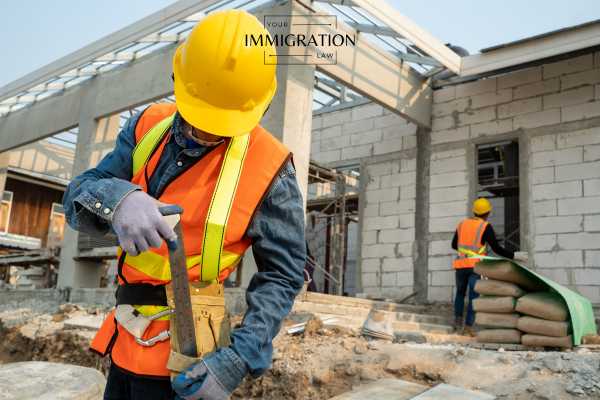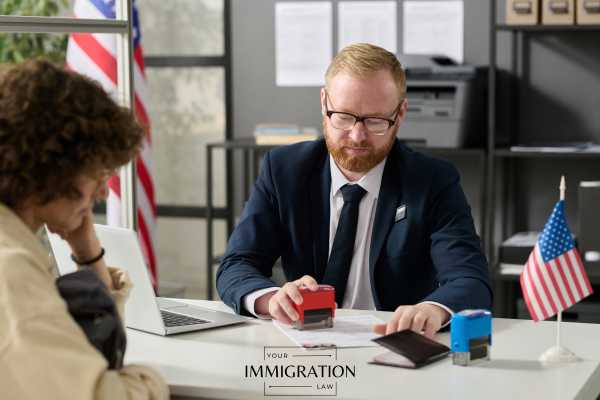If you’re interested in working in the United States for a temporary period, the H-2B visa could be your ticket to new opportunities. This type of visa is designed for foreign nationals who want to take on seasonal or temporary jobs. Having an H-2B visa lawyer can be incredibly helpful as you navigate the application process and ensure you meet all the necessary requirements for becoming a temporary worker in the U.S.
Contact a lawyer today at 313-631-8080 to get personalized guidance through every step of the process and improve your chances of success.
Discover the H-2B Visa Program: Your Pathway to Seasonal Work
The H-2B visa program allows American employers to bring foreign workers to the United States for non-agricultural jobs. This program is perfect for employers who have a high demand during peak seasons or for specific projects. H-2B holders can gain valuable work experience and earn income while exploring a new culture, making it an exciting opportunity for many prospective workers. Understanding the H-2B program is your first step toward unlocking these fantastic opportunities!
Who Can Join the Workforce? Types of Workers Eligible for H-2B Visas
To qualify for this visa, both potential employers and workers must meet certain eligibility criteria:
- Employers: They must prove that there are not enough U.S. workers who are able, willing, and qualified to do the temporary work. This means that employers need to actively recruit American citizens before they can hire foreign citizens on an annual basis. The need for temporary non-agricultural positions often arises from seasonal demands, such as increased business during holidays or summer months.
- Job Requirements: The job must be on a temporary basis, seasonal, peak load, or a one-time occurrence. For example, a ski resort might hire extra workers during the winter season or a landscaping company might need help during peak spring months. The temporary nature of the job is crucial in establishing the need for foreign workers.
- Workers: Foreign nationals must come from eligible countries designated by the Department of Homeland Security (DHS). This list includes countries whose citizens are allowed to apply for H-2B visas, ensuring that the program can provide valuable opportunities to those in need of work.

Navigating the H-2B Visa Application Process: Step-by-Step Guide
Navigating the application process for the H-2B visa can seem overwhelming, but it doesn’t have to be! By understanding the steps involved, U.S. employers can effectively secure the temporary non-agricultural workers they need. This guide will break down the essential steps in filling out the numerous forms, including obtaining the Temporary Labor Certification (TLC) and filing Form I-129, making the process as smooth as possible.
Kickstart Your Application: Filing the Temporary Labor Certification (TLC)
Before applying for H-2B visas, U.S. employers need to obtain a Temporary Labor Certification (TLC) from the Department of Labor (DOL). This certification is crucial as it proves that hiring foreign workers will not negatively impact U.S. workers. Employers must show that they have made efforts to recruit local workers but were unable to find enough able, willing, and qualified candidates for the temporary positions. This requirement ensures that national workers are given the first opportunity to fill available employment positions.
To begin the process, employers must submit a job order to the DOL that details the job description, required skills, and the duration of the work. This job order should also clearly indicate the temporary nature of the employment, whether it’s for peak load periods, seasonal work, or a one-time occurrence. A work visa lawyer can be invaluable during this stage, helping employers compile the necessary documentation and navigate the complexities of the application process.
Once the job order is filed, employers are required to actively recruit for the position, which may include advertising the job in local newspapers or on job boards. It’s important for employers to keep records of their recruitment efforts, demonstrating that they have tried to find qualified U.S. workers. After this recruitment period, if the employer can prove that there are not enough qualified American workers, they can proceed with the application for the TLC.
Mastering Form I-129: Your Key to Securing an H-2B Visa
Once the temporary labor certification application is approved, employers must file Form I-129 (Petition for a Nonimmigrant Worker) with U.S. Citizenship and Immigration Services (USCIS) to petition for H-2B qualified workers. This sounds like a complex process so the guidance from an immigration lawyer can ensure things are done right the first time. This form requires detailed information, including proof of the temporary nature of the job and the need for foreign workers. Employers will need to provide documentation that clearly outlines how many workers are needed, the specific duties they will perform, and the duration of employment.
An experienced immigration attorney can help prepare and submit the petition, reducing the risk of errors and delays, which is essential for prospective workers eager to start their new roles. They can guide employers in gathering the necessary supporting documents, ensuring everything is in order for a smooth review by USCIS.
Completing the Form I-129 accurately and thoroughly is critical, as it directly impacts the approval process for H-2B workers. By collaborating with an H-2B visa lawyer, employers can navigate the complexities of this step confidently, making it easier to secure the temporary workforce they need.
The H-2B Visa Cap and Lottery: What You Need to Know
Each year, there is a cap on the number of visas available. Currently, there are 66,000 visas available each fiscal year, divided into two halves: 33,000 for the first half and 33,000 for the second half. If the number of applications exceeds the cap, a lottery system is used to determine which petitions will be processed, adding another layer of complexity to the application process.
H-2B Visa Duration and Extensions: What to Expect
The initial validity period for these visas is typically granted for up to one year. However, in certain circumstances, it is possible to extend the H-2B visa for up to three years. This flexibility allows temporary workers to continue their employment during busy seasons without starting the process all over again, providing stability for both the employer and the foreign worker.

Maximize Your Chances: The Returning Worker Exemption for H-2B Visas
The returning worker exemption allows certain H-2B workers who held H-2B status within the last three years to be exempt from the annual cap. This exemption is beneficial for both workers and employers, as it provides more flexibility in hiring returning workers. An H-2B visa lawyer can help employers identify and utilize this exemption effectively, ensuring they can meet their workforce needs.
How Long Does It Take to Obtain an H-2B Visa?
The time it takes to obtain a visa can vary based on several factors, including the timing of applications and the processing speeds of the DOL and USCIS. Generally, it can take a few months from the filing of the TLC to receiving the visa. Planning ahead and starting the application process early can help reduce wait times for both employers and foreign nationals looking to secure their H-2B status.
Frequently Asked Questions
- What is the typical processing time for an H-2B visa application? The typical processing time for an H-2B visa application is around 4 to 6 months, but it can vary depending on the case and the time of year.
- Can H-2B workers apply for permanent residency? H-2B workers generally cannot apply for permanent residency through the H-2B visa, as it is a non-immigrant visa for temporary work.
- How often can an employer petition for H-2B workers? An employer can petition for H-2B workers as often as needed, but they must prove the need for temporary, seasonal, or peak-load workers each time.
- What are the consequences of H-2B visa violations? H-2B visa violations can lead to the visa being revoked, deportation, and potential bars from re-entering the U.S. in the future.
- Can H-2B workers change employers during their stay in the US? H-2B workers can change employers during their stay, but they must obtain approval from U.S. Citizenship and Immigration Services (USCIS) before starting a new job.
Conclusion
Working with an H-2B visa attorney can make a big difference in successfully navigating the application process. Legal guidance is crucial for ensuring compliance with regulations and avoiding costly mistakes. If you’re ready to start your journey toward securing the temporary workers your business needs, contact Your Immigration Law today to learn how we can assist you in the H-2B visa process!